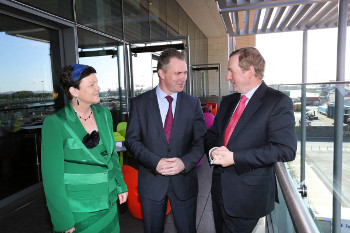Tax cut needed to kick-start growth, says Retail Ireland

Group believes the entry point to the higher marginal tax rate should be increased, and the marginal rate reduced below 50%
12 May 2014
Retail Ireland has said 2014 will see the start of a meaningful recovery in the sector. Hosting the Retail Ireland MasterCard Annual Conference in Dublin’s Gibson Hotel on Tuesday 6 May, the group said that despite somewhat disappointing Q1 retail figures, there are signs that many consumers are returning to the shops after a long hiatus. It predicted that this will lead to consumer spending growth of nearly 2% this year.
Retail Ireland added however that intense competition meant many retailers were only just surviving. It warned against any increase in business costs and called on government to cut income tax to boost spending and stimulate activity in the domestic economy.
The conference, which was opened by Taoiseach Enda Kenny heard that the sector has the potential to create 40,000 new jobs over the coming years, if the conditions are right. Other speakers included: Baroness Lucy Neville-Rolfe, president of EuroCommerce, and former executive director, Tesco; Garry Lyons, chief innovation officer and head of Labs, Mastercard; and Shane Daly, head of Retailer Services at Nielsen Ireland.
Recent retail sales figures have shown that while the volume of sales (excluding cars and bars) has increased by 2.2% in the past year, the values of sales has stayed the same. This clearly indicates that shops are aggressive discounting in an effort to attract customers. The pressure on the sector remains. To address the key challenges that still face the sector, Retail Ireland called on government to:
• Cut income tax: The tax burden is too high and tax on work is way out of line internationally. The entry point to the higher marginal tax rate should be increased, and the marginal rate reduced below 50%. This will put more money into the pockets of Irish consumers, and ultimately benefit the Exchequer though greater economic activity and tax revenue.
• Ensure regulation is sensible, proportionate: Any new regulation of the sector and the supply chain shoud not impose extra costs on retailers. The government should do nothing that would increase business costs. At the height of the boom many costs, including wages, spiralled out of control, we cannot allow this to happen again,
• Support the move online: Provide support and incentives for Irish retailers to trade online and ensure they benefit fully from the growing digital economy. At present 75% of online spend goes to companies without a physical presence here. We need to address this trend.
Speaking in advance of the event, Retail Ireland director Stephen Lynam said: "Retail has been through the horrors, but the outlook is starting to look up. With good news on the jobs front and consumer confidence improving, we predict that consumer spending will increase by 1.9% this year. We can add 40,000 new jobs by 2020 to the existing total of 270,000 if we can get growth going in the economy and restore consumer spending to more normal levels.
"As the largest private sector employer, retail is crucial to Ireland’s economic revival. Not only does it generate employment in its own right, it is also hugely important for our agriculture sector, with retailers spending €5 billion annually on Irish food and drink products. A thriving retail sector will generate billions in tax revenue for the Exchequer and thousands of jobs right across the country."



 Print
Print






Fans 0
Followers